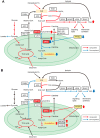Lipid Metabolic Reprogramming in Hepatocellular Carcinoma
- PMID: 30445800
- PMCID: PMC6265967
- DOI: 10.3390/cancers10110447
Lipid Metabolic Reprogramming in Hepatocellular Carcinoma
Abstract
Metabolic reprogramming for adaptation to the local environment has been recognized as a hallmark of cancer. Although alterations in fatty acid (FA) metabolism in cancer cells have received less attention compared to other metabolic alterations such as glucose or glutamine metabolism, recent studies have uncovered the importance of lipid metabolic reprogramming in carcinogenesis. Obesity and nonalcoholic steatohepatitis (NASH) are well-known risk factors of hepatocellular carcinoma (HCC), and individuals with these conditions exhibit an increased intake of dietary FAs accompanied by enhanced lipolysis of visceral adipose tissue due to insulin resistance, resulting in enormous exogenous FA supplies to hepatocytes via the portal vein and lymph vessels. This "lipid-rich condition" is highly characteristic of obesity- and NASH-driven HCC. Although the way in which HCC cells adapt to such a condition and exploit it to aid their progression is not understood, we recently obtained new insights into this mechanism through lipid metabolic reprogramming. In addition, accumulating evidence supports the importance of lipid metabolic reprogramming in various situations of hepatocarcinogenesis. Thus, in this review, we discuss the latest findings regarding the role of FA metabolism pathways in hepatocarcinogenesis, focusing on obesity- and NASH-driven lipid metabolic reprogramming.
Keywords: carnitine palmitoyltransferase 2; fatty acid β-oxidation; hepatocellular carcinoma; metabolic reprogramming; non-alcoholic fatty liver disease; obesity.
Conflict of interest statement
The authors declare no conflicts of interest.
Figures


References
-
- Shiina S., Tateishi R., Arano T., Uchino K., Enooku K., Nakagawa H., Asaoka Y., Sato T., Masuzaki R., Kondo Y., et al. Radiofrequency ablation for hepatocellular carcinoma: 10-year outcome and prognostic factors. Am. J. Gastroenterol. 2012;107:569–577. doi: 10.1038/ajg.2011.425. - DOI - PMC - PubMed
Publication types
LinkOut - more resources
Full Text Sources
Other Literature Sources
Research Materials
Miscellaneous

